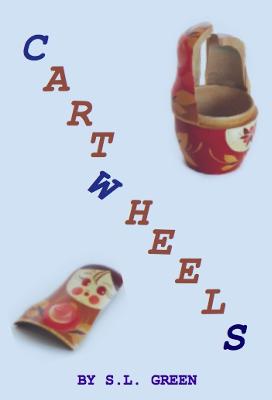Cartwheels
by S.L Green
(Vancouver Island, BC, Canada)

Would there be a thud when she hit the tile, or would Sheila hear the skull crack?
She shudders and clutches Emma more tightly. Thirteen beige Berber steps lead down to the basement. Such dingy linoleum tiles on the floor at the bottom. Sheila had wanted to tear them up and put in hardwood, but like everything else, that idea went on hold when she got pregnant.
If, God forbid, Sheila were to stumble and cartwheel down, losing her grasp on Emma so Emma did her own cartwheels, and the two of them landed in crumpled heaps....
She takes a step back. Lowers her head to kiss the downy hair of her daughter. Breathes in the intoxicating scent of innocence.
A car pulls into the driveway: Erik. It's almost seven.
She glances again at the staircase. If she went down too, it would appear to be an accident, a horrible tragedy, no one's fault, poor Sheila. A broken leg, perhaps, but when it heals, new life. Or the tub: the phone might ring, she might leave Emma for just a minute - only a minute - and then, dear God, help us. That would be a mistake, though, not an accident. Erik may not forgive a mistake.
But what is she thinking? A smile. Put on a smile, now, and give the lovely child to her father. Here, you take her. Shoes on, coat zipped, out the door. Just to walk alone. Already feeling better.
She needs to tell somebody - anybody - but the strangers on the street will think her a madwoman if she spills her mind's horrors to them. The stranger at home - when did he become a stranger? - will surely reject her. His eyes will widen with alarm, and he'll take her sweet Emma and leave. Or maybe stay, and have Sheila sent away instead. Sent away. Locked away. Forever banished from Emma's life. Maybe she should go before it comes to that.
But she needs to stay. She's a good mother. Good mothers stay. She was a good student, a good employee, a good wife. Of course she's a good mother. She will stay. Bury the nightmares. Defeat them. Be strong. Be good.
It wasn't supposed to be like this. She knew about the blues. Knew they would pass. But this, this was so much more than the blues. This was dark shadows tumbling heels over head through her soul, contorting her mind and confusing her emotions. Sometimes she thought she saw a pinprick of light, but in the next breath it would be snuffed out.
That night, Emma doesn't sleep after her three a.m. feeding. Fusses and cries. Gas, maybe. Sheila walks with her, jiggles, sings, pats, pleads. She is so tired.
Finally Emma quiets. When Sheila stops pacing, she's standing again at the top of the stairs. She rocks slowly side to side, putting herself into an empty trance even as she lulls Emma to sleep. Back and forth, back and forth.
Back and forth.
Back and forth.
She doesn't hear the sound. She is swaying, still, looking down the thirteen Berber-covered stairs at Emma. She wants to feel something. She wants to react, to gather her infant in her arms, to wail, to scream, but there is nothing.
Her gaze slips from the still infant to the dingy tile. She sinks onto the top step and imagines how the scene might look with hardwood.
